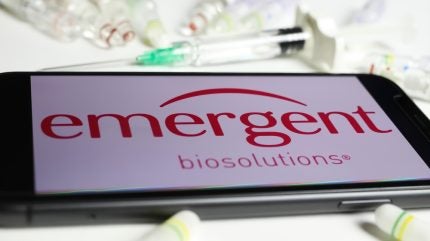
Emergent BioSolutions said it would donate 50,000 doses of its smallpox vaccine to the Democratic Republic of the Congo (DRC) and other countries impacted by the current mpox health emergency, as cases rise due to a new variant in the region.
Emergent’s pledge, conducted through the humanitarian relief organisation Direct Relief, will see Burundi, the DRC, Kenya, Rwanda and Uganda receive doses, as per a 19 August press release.

Discover B2B Marketing That Performs
Combine business intelligence and editorial excellence to reach engaged professionals across 36 leading media platforms.
The donation follows a plea from South Africa’s president Cyril Ramaphosa to ensure a more equitable distribution of vaccines and therapeutics compared to the previous mpox outbreak in 2022.
Last week, Africa Centres for Disease Control and Prevention (CDC) issued a public health emergency amid outbreaks of mpox on the continent, which was swiftly followed by a global health emergency of international concern declaration by the World Health Organization (WHO). Emergent’s stock has risen 39% since Africa CDC declared the public health emergency. The US company has a market cap of $640m.
The new variant of the virus, known as clade Ib, has spread rapidly in Africa. Last week, a case was confirmed in Sweden, marking the first time the new variant has been seen outside of Africa.
Though Emergent’s ACAM2000 vaccine is approved for smallpox, it is currently available for mpox immunisation under the Expanded Access Investigational New Drug (EA-IND) protocol.

US Tariffs are shifting - will you react or anticipate?
Don’t let policy changes catch you off guard. Stay proactive with real-time data and expert analysis.
By GlobalDataEmergent filed a supplemental biologics licence application (sBLA) to the US Food and Drug Administration (FDA) in October 2023, seeking an expanded mpox indication for ACAM2000. The sBLA has an FDA target for review completion in Q3 2024.
Vaccine side effects
The FDA has previously noted the side effects and risks of ACAM2000. Emergent’s product is known to cause myocarditis and pericarditis – swelling in or around the heart muscle – in one in 175 recipients, as per the FDA. Those with an immunocompromised immune system such as patients with HIV may not be eligible for the vaccine. Africa is the most HIV-affected region in the world.
“The risk of experiencing serious side effects must be weighed against the risk of experiencing a potentially fatal smallpox infection,” the agency previously stated in a 2022 information sheet.
Bavarian Nordic’s Jynneos has been studied in HIV-infected individuals and adverse events observed then were similar to those in non-HIV-infected individuals.
ACAM2000 is made from vaccinia, a virus that is closely related to smallpox but causes milder disease. The live virus is administered not via a traditional shot but instead by a two-pronged needle which pricks the skin several times.
Emergent’s CEO Joe Papa said: “Currently, we have additional product already in inventory, with the ability to increase supply by approximately 40 million doses, if and potentially when needed.”
Emergent joins global effort
Emergent’s 50,000 doses follow Bavarian Nordic’s pledge to donate 40,0000 doses of its Jynneos vaccine, also known under the names MVA-BN and Imvamune. The donations will accompany a supply of around 175,420 doses ordered by the European Health Emergency Preparedness and Response Authority (Hera).
Bavarian Nordic has also submitted data to the European Medicines Agency (EMA) to support an extension for the vaccine’s use in teenagers.
The Danish company is preparing trials to study the vaccine’s use in children aged 2-12 years. The trial, partially funded by the Coalition for Epidemic Preparedness Innovations (CEPI), is expected to start in the Democratic Republic of Congo and Uganda later this year. Bavarian Nordic said this could also potentially support the vaccine’s regulatory approval for this specific age group in African countries.




